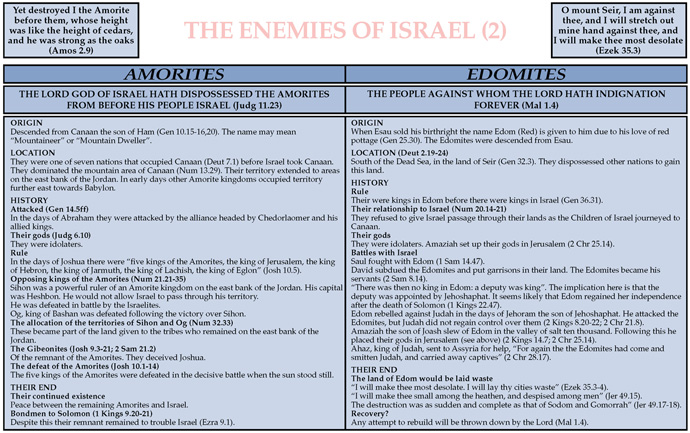
THE ENEMIES OF ISRAEL - THE AMORITES
The name "Amorite" means "Mountaineer" or "Mountain Dweller". They were descended from Canaan the son of Ham (Gen 10.15-16,20). This was the "Ham" who behaved in an unseemly manner when he found Noah lying in a shameful condition as a result of being under the influence of alcohol.
Their early history
Long before the Children of Israel entered Canaan the Amorites were a power in the region. They are to be found in Genesis 14 when the Babylonish Alliance attacked the Sodom Alliance, which had laboured under the yoke of those Babylonish powers for twelve years. Amorites who lived in Hazenon-tamar were attacked in the onslaught, and although they may not have been the dominant power in the region, they were powerful enough to attract the attention of the invader. They certainly formed part of the confederation of states that occupied Canaan.
During the days of the Exodus
During the centuries when the sons of Jacob and the nation that came from them were in Egypt the Amorites emerged as a mighty people in their own right. They became the most powerful inhabitants of Canaan. They also had expanded their territory to the east bank of the Jordan, and, on the approach of the Israelites, there were two mighty Amorite kingdoms, those of Og, king of Bashan, and of Sihon, king of Heshbon, which barred the progress of Moses. Secular history tells of the Amorites spreading further east beyond the kingdoms of Og and Sihon.
Dealing with Og and Sihon
Og was one of the remnant of a race of giants (Deut 3.11). Giants were to be found in Canaan before Israel's conquest of the land. These giants, or Rephaim, had to be overcome by Israel (Josh 17.15). Og was not, therefore, an Amorite although his subjects were of that people as he is noted as one of the two kings of the Amorites defeated by Moses.
The account given in the book of Numbers (Num 21.21-31) shows that Sihon not only came out against Israel with his armies, but that he also took the initiative in the hostilities, for he "fought against Israel". It would appear that he also chose the site for the battle for he came out to fight at Jahaz. The advantage appeared to lie strongly with him. The Amorites were a powerful people with a history of conquest. The site of the battlefield was chosen, doubtless as it appeared to be advantageous to them. The choice to go to war was theirs, indicating the confidence that they had in their power to overcome this itinerant people, who since their defeat on their previous attempt to enter Canaan had shown no evidence of military strength or prowess. All the advantages appeared to lie with the Amorites!
Archaeologists have shown that the kingdoms of that age protected themselves by the construction of fortified positions or forts on their borders. It would appear that, confident of the apparent weakness and lack of military experience on the part of the Children of Israel, Sihon advanced into open territory beyond his defensive positions to bring the battle to his opponents. The defeat of Sihon was total. Every city under his rule was overwhelmed and men, women, and children were "utterly destroyed" (Deut 2.34).
The five kings of the Amorites
Within Canaan, Joshua still faced the Amorites. They represent the power of human pride and intellect, opposing those who seek to enjoy the blessing bestowed by the Lord on His people. There were five kings of the Amorites: Adonizebek, king in Jerusalem, Hoham, king in Hebron, Piram, king in Jarmuth, Japhia, king in Lachish, and Debir, king in Eglon, confirming the power of the Amorites within Canaan (Josh 10.3,5). The alliance of these kings was defeated by Joshua who "slew them with a great slaughter at Gibeon" (Josh 10.10).
Later history
The Amorites had been destroyed as a powerful nation by Joshua. However, they were not completely banished from Canaan and continued to act as an evil influence for Israel (Judg 1.34). David subdued the Amorites and during the reign of Solomon they were his servants. The Lord determined their demise: "Yet destroyed I the Amorite before them, whose height was like the height of the cedars, and he was strong as the oaks; yet I destroyed his fruit from above, and his roots from beneath (Amos 2.9). The destruction of "his fruit" refers to all that they built or left behind them, every sign of their civilization, and "his roots from beneath" refers to the fact that the Lord will not allow them to grow again.
THE ENEMIES OF ISRAEL - THE EDOMITES
The Edomites were descended from Esau, the son of Isaac, and the twin brother of Jacob. He was the older of the twins, but the birthright passed to Jacob. During the absence of Jacob at Padan-aram Esau moved to Seir from whence he came to welcome Jacob on his return from after an absence in excess twenty years (see Gen 32.3-33.16; 36.6). This nation typifies the flesh with all its pride and desire for power. They relied on their apparently impregnable mountain land and their skill in war, caring nothing for Israel and seeking their ill. The enmity that marked the early feelings of Esau towards Jacob after his brother had obtained the blessing from Isaac characterised all their dealings with Israel. This was despite the softening of attitude that appeared to mark Esau when he met the returning Jacob.
Their land
Seir lay between the Dead Sea and the Red Sea and had been occupied by the Horites (Gen 14.6). It was a narrow, mountainous area, about one hundred miles long and between twenty and forty miles wide. The western boundary was with the land of Canaan with the eastern desert being the other boundary. The Edomites were a war-like people and occupied the heights of Seir (Jer 49.16). Kings ruled them, an aristocracy descended from Esau (Gen 36).
During the Exodus
When the Children of Israel moved north from Horeb they were refused passage through the land of the Edomites. Despite Moses reminding them that the Israelites were their blood relations and that they had suffered in the land of Egypt (Num 20.14-15), Edom replied that they would meet Israel by force should they enter their territory (Num 20.18). Israel responded by turning from the way through Edom to travel through the land of Moab. They refused to do battle with the descendents of Esau.
Later history
In the reigns of David and Solomon
Saul made war with the Edomites (1 Sam 14.47), as did David, who completely overwhelmed them (2 Sam 8.14) in the wars when he subdued the nations surrounding his kingdom.
During the reign of Saul, Doeg the Edomite, his chief herdsman, reported to Saul that Ahimelech, the High Priest, had given the showbread as food to David, who was at that time fleeing from Saul.
When the servants of Saul would not obey his order to slay Ahimelech and the other priests, Doeg did so. Eighty-five priests died in the slaughter, as did their wives and children (1 Sam 22.9-19).
David placed garrisons in Edom and they became a tributary people. David made them his servants. The extent of Israel's control over Edom is seen in the use that was made by Solomon of the port of Ezion-geber, on the Red Sea coast of the territory of Edom, to built naval ships (1 Kings 9.26). It is possible that Edom regained her independence after the death of Solomon, although there is nothing in Scripture to record that this had taken place.
In the reign of Jehoshaphat
During the reign of Jehoshaphat it is noted that "There was then no king in Edom: a deputy was king" (1 Kings 22.47) indicating that Judah regained control over Edom and appointed a "deputy".
In the reign of Jehoram
Edom rebelled against Judah in the days of Jehoram the son of Jehoshaphat. Joram, king of Israel attacked Edom, but Judah did not regain control over her (2 Kings 8.20-22).
In the reign of Ahaz
Ahaz, king of Judah, sent to the king of Assyria to ask for help in the wars against the Edomites who had taken captives from Judah. This was at a time when the ungodly Ahaz had caused the Lord to bring Judah low (2 Chr 28.16-19).
Prophecies of downfall
The complete downfall of Edom was prophesied. Their continued hostility to Israel brought down on them the judgment of God. How this took place is not recorded in Scripture. However, the word of God stood: "Thus saith the Lord God; Because that Edom hath dealt against the house of Judah by taking vengeance, and hath greatly offended, and revenged himself upon them; Therefore thus saith the Lord God; I will also stretch out mine hand upon Edom, and will cut off man and beast from it; and I will make it desolate from Teman; and they of Dedan shall fall by the sword" (Ezek 25.12-13). Edom did become a desolation (Joel 3.19).
Despite this, the pride in the hearts of the Edomites led them to seek to rebuild their kingdom. They failed to see the hand of God in their demise. The Lord decreed, however, that this would not take place and today there is little trace of the mighty nation that once occupied Seir.









